#cptsd coping
Text
the time you spent healing is not wasteful and you can still feel sad about the things you missed out on because you took time to heal.
#i am learning!!!!!#trauma recovery#be kind to yourself#positive self talk#actually traumatized#complex trauma#healing#gentle reminder#actually bpd#self love#cptsd healing#cptsd survivor#cptsd recovery#living with cptsd#just cptsd things#cptsd coping#traumatic childhood#childhood trauma#complex ptsd#self acceptance#recovery quotes#healing journey#self compassion#self awareness#mental health#recovery#yourhealingjournal
20 notes
·
View notes
Text
how do you reconnect to life after being disconnected for so long
#cptsd healing#cptsd recovery#actually cptsd#cptsd problems#cptsd coping#cptsd advice#cptsd tag#ptsd#ptsd treatment#childhood ptsd#complex ptsd#madd#dissociative vent#depersonalization#depersonalisation tw#depersonalisation and derealisation#idk depersonalized?#depersonalisation disorder#derealistion#derealisation tw#derealisation disorder
758 notes
·
View notes
Text

#trauma#childhood trauma#ptsd#complex post traumatic stress disorder#just cptsd things#actually cptsd#rick and morty#emo#mental instability#bipolar disorder#bpd problems#attachment issues#avoidant attachment#adulting#relationship goals#cptsd coping#cptsd symptoms#emotional#bpd stuff#depression#anxiety funny#funny content#adult swim
932 notes
·
View notes
Text
Bouncing back and forth between “i don’t wanna be alone” and “i want to isolate myself” is quite the wild ride.
But incase you weren’t aware, these are both ways a fear of abandonment can show itself.
#abandonment trauma#abandonment#attachment trauma#mental health#dealing with grief#heartbroken#abandoned#abandonment issues#cptsd coping#fearful avoidant#attachment#anxious attachment#dismissive avoidant
2K notes
·
View notes
Text


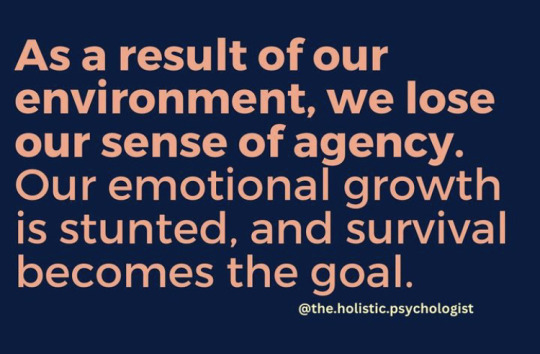


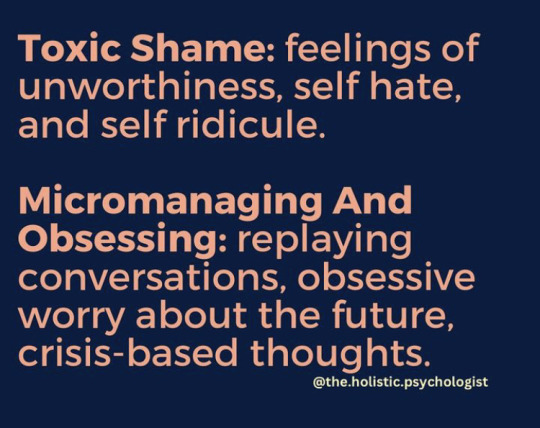
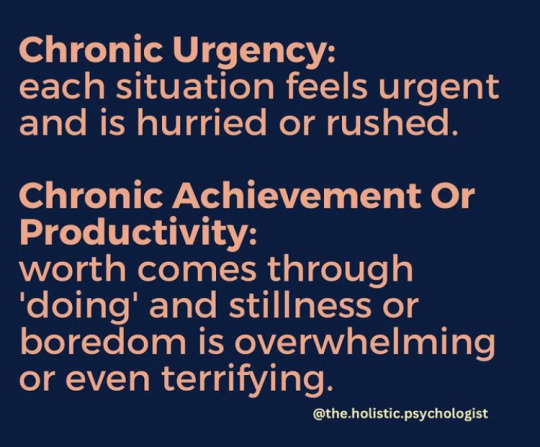
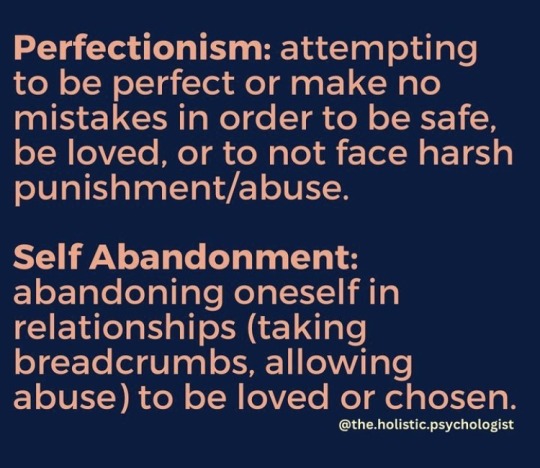
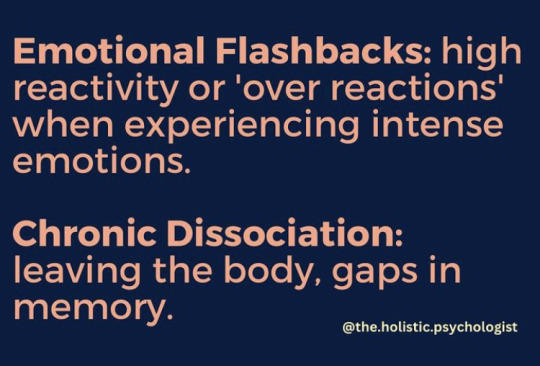
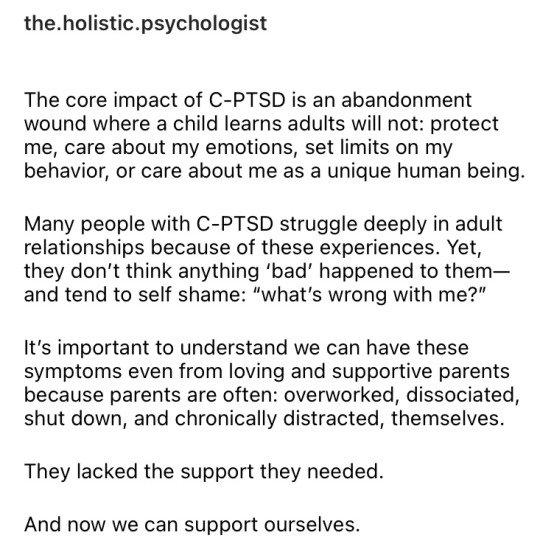
#childhood trauma#complex post traumatic stress disorder#cptsd#cptsd coping#cptsd recovery#hypervigilance#inner critic#trust issues#dysfunctional household#shame#toxic shame#perfectionism#self abandonment#emotional flashbacks#disassociation
471 notes
·
View notes
Text
Hello everyone, I have a DID-related question?Please bear with me. I'm still pretty new to the DID terminology, as I've only been diagnosed about a year and a half ago, but I'm a 40+ she/her... complete with that apparently unintentionally ominous gen x punctuation style. Oops!
I have a question for any systems out there. I hope I'm not offending anyone, if so it's not by design!! But I would be super grateful if anyone could offer some insight;
It's about my "littles". In therapy I learnt to view them as younger versions of myself that never got to grow up. These littles of mine are practically mute but I'm learning to recognize it if they communicate wants and emotions.
When they are "close to the surface", "close to the front" or "cofronting", what do I call it... Well, at such times it's hard for me to talk?!? And that's a practical problem sometimes!
Do other systems have that with their littles? It might be because they're sometimes scary to me (they are the traumaholders, after all)? Or because they don't have full control of the body? (My function in this system of identities is that of the caretaker or activity coach I guess)
If this is a familiar problem, how do you, other systems, deal with the (partial) muteness? I would love any insight and again I apologize if I have inadvertently hurt anyone by asking about this.
💓
#dissociative identity disorder#did#actuallydid#did osdd#cptsd#cptsd coping#did coping strategies#cptss#actually osdd
11 notes
·
View notes
Note
Hi! Do you know of resources for direct mental health support that 1) aren't part of the psych system (aka no warmlines, hotlines, psych wards, phps, iops, individual therapy, etc) and also 2) aren't support groups?
I have pretty severe CPTSD and I'm noticing that I need support, but because of my trauma groups don't work for me, and I have had so many negative experiences with traditional mental health supports that I just don't trust them. I have been trying for years to form a support network but I currently only have one person, so anything that involves reaching out to an already existing support network is off the table.
Hey anon! Thanks for reaching out.
That makes a lot of sense that you would want support that is outside the mental health system and also doesn't require participating in groups. I know it can be exhausting to try to find support when everyone just suggests traditional mental health resources, so kudos to you for advocating for the type of support that you need. I have a few suggestions, but as always, you're going to know yourself + your needs best!
My first thought is to find an individual peer support advocate. Depending on the organization they work with, they might be able to offer things like weekly meetings for emotional support, help with crisis planning, connecting you to resources, or even coming to your house to help with material needs like meal planning, chores, etc. Project LETS is an abolitionist organization that has a Peer Mental Health Advocate program. I personally am friends with several of the people at this org and can vouch that they will never engage with the mental health system or cops without your consent. This is a database of Abolitionist Care providers, and there are a lot of peer supporters who don't work in the mental health system listed on this database. Peer Support Space also offers some fabulous 1-1 peer support options.
Another way to find direct peer support If you're in the United States, most states have databases with all the people who are certified as peer support specialists in the state. Depending on what organizations they work for, state requirements, etc, there might be different requirements to access peer support services, and more potential entanglement with the mental health system through that option. Searching for mental health services, especially supportive living services in your area, might help you find organizations that also have individual peer support programs that aren't directly connected to things like therapy, IOP, etc. Totally understand if that isn't a desirable option because of the increased association with MH services, but happy to give you more specific info if you want to share what state you're in on another anon ask.
For me, seeking out educational resources, books, workbooks, and seminars, was a super helpful way to build my confidence in my own capabilities to cope with my distress and navigate healing. I'll link a bunch of resources-as always, take what works and leave the rest!
Out Of The Storm: CPTSD community and tons of resource lists, book recommendations, etc
List of resources + books for CPTSD: (Have not read most of these, would def reccomend seeking out content warnings and reviews for any books!)
Madness, Oppression, and Mad Mapping: Self guided workbook for mapping our madness, evaluating how oppression shows up in our life, how distress shows up in our life, what healing and coping might look like.
IDHA has a TON of amazing seminars, self paced courses, trainings, on topics ranging from trauma to anticarceral crisis response. Some cost money and some are free.
I hope some of these resources are helpful, but please feel free to reach out again if you are looking for something different. Followers with relevant experience, please add on your own resources or tips! Truly wishing you the best, anon, and hope that you're able to find the healing + support that you're looking for 💜
26 notes
·
View notes
Text

#actuallytraumatized#actually ptsd#trauma#coping#vent#tw vent#ventcore#trauma vent#cptsd coping#childhood trauma#weirdcore#sadcore
11 notes
·
View notes
Text
If you've been abused or traumatized, you're allowed to take the power back any way you can as long as it's not hurting others or yourself.
Go spiritual, drink that green juice shit, adopt a fucking lizard, start jogging, stay in bed with rom coms, snack on ice cream with your lactose intolerant ass (yeah i see u).
Vent, scream (not AT people tho), cry, talk about it. Post about it. Forget they exist, minimize their existence, go through past arguments and study them to find the red flags. Go radio silent for the peace. Decongest yourself from the noise in your head. Shit, put them in a story and make them who they really are, not who they pretend (personal fav). Or put someone in a story or poem to memorialize them if you have trauma of losing someone.
Do things you love that they hated, out of spite, out of peace, out of exhilaration and freedom. Go throw some rocks at a pond, break some glass in a safe place, go to therapy, let your friends give you advice or let them be your shoulder to cry on (w consent). Go balls to the wall slutty ( we love sluts here, just b safe) or honor yourself with abstinence. Don't let people act like what you're doing isn't right because it's not recommended by stereotypical healing or its not what they would do.
Do whatever you gotta do within reason,
Just don't find solace in hurting others and continuing the cycle, and try not to do toxic things that destroy you.
Oh and drink water you dehydrated bastards.
#emotional abuse#trauma#mental health#mental illness#mental abuse#emotional#true words#abuse survivor#healingjourney#self healing#healing#c ptsd#ptsd#complex ptsd#coping#cptsd coping#coping skills
30 notes
·
View notes
Text
No shit.
I mean, more aptly put:
... In 2018, a study by the same team found that written exposure therapy was as effective as cognitive processing therapy, another first-line, or most highly recommended, PTSD treatment.
Writing down traumatic memories may be easier for some people, if they feel shame or embarrassment about what happened to them, said Denise Sloan, a psychologist who helped develop the treatment and is an author of the study. She said patients were asked to write by hand, which takes longer and allows them to engage with the memory.
“It’s a slower process, that allows them to better think through ‘what happened next, and who was there, and what did they say,’ because they’re writing about it,” said Dr. Sloan, associate director of the Behavioral Science Division of the National Center for PTSD. “It slows everything down, versus just saying it out loud.”
The therapy was inspired by the work of James Pennebaker, a Texas psychologist who, in the 1980s, began experimenting with what he called “expressive writing,” and found that people who regularly wrote about negative life experiences had stronger immune systems and paid fewer visits to the doctor.
The first study of written exposure therapy as a treatment for PTSD appeared in 2012. It works, Dr. Sloan said, much the way other trauma-focused treatments do: by allowing the client to confront the traumatic memory, lessening their fear and avoidance, and allowing them to identify misconceptions like self-blame.
#trauma recovery#writing therapy#my therapist approves this message#theraputic writing#writing for catharsis#catharsis#dark fic#fanfiction thoughts#fanfic history#ao3 writer#ptsd mention#cptsd coping#complex ptsd#ptsd recovery
10 notes
·
View notes
Text
Death threats for writing my life stories about my dealings with abuse and narcissism. How lovely, yet expected, considering the demographic. I’m definitely receiving way more heat than support, however, it just feeds fuel to my internal, blazing fire.  It makes me really feel like I’m a lot more alone than I had originally thought with what I’ve survived.
#red flags#gaslighting#malignant narcissism#abuse recovery#ptsd flashbacks#narcissistic abuse#abuse survival#cptsd coping#living with cptsd
22 notes
·
View notes
Text
Abandonment from a friend can hurt just as much as abandonment from a lover
#abandonment trauma#abandonment#attachment trauma#mental health#abandoned#abandonment issues#cptsd coping#bpd mood#friendship#drifting apart
144 notes
·
View notes
Text

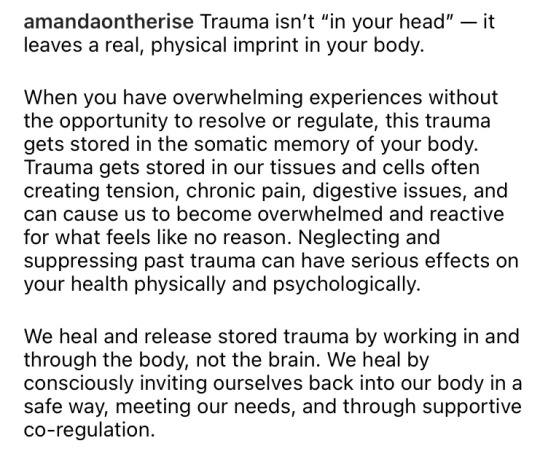
By @amandaontherise
#mental health#self care#recovery#healing#self love#self compassion#trauma recovery#trauma response#living with cptsd#cptsd coping#complex ptsd#complex post traumatic stress disorder
770 notes
·
View notes
Text
I turn 23 next month. That means it'll be 12 or 13 years that I've been no contact with my mother.
I spent the first 2 or 3 years in disbelief that she wasn't a part of my life any more.
I spent the next 4 wondering what I did wrong and how I could fix it.
The next 3 years I came to terms with it. She said she wanted to be a part of my life again just after my 18th birthday, and I said no.
My early 20s have been plagued with hatred for her. For abandoning me when I needed it most. For not being a better mother to my siblings that still live with her.
I don't want to hide behind a mask anymore. People have told me before that they thought my mom was dead, and to me she is.
I want to find peace.
#estranged#cptsd coping#personal rant#mental health#toxic mother#moving forward#diary#cptsd vent#traumatic childhood#healingjourney
2 notes
·
View notes
Text
“Your trauma made you hot at least.”
Thanks it also gave me brain damage 🙃
#mental health#mental wellness#mental illness#cptsd problems#cptsd life#cptsd symptoms#cptsdwarrior#cptsd coping#trauma#somatic symptom disorder#developmental trauma#girls who smoke weed#stoner witch#healing
10 notes
·
View notes
Text
A new OSDD/DID combo cheat for terror/panic attack!
- keeping the eyes open to minimize flooding and switching, looking at an object in the room that was gotten in the last calendar year to ground in the present
- heavy stuffy on the chest
- EMDR bilateral music in headphones
- alternate thumbs rubbing on stuffy
- eventually when able to move more, alternate palms rubbing slowly on stuffy's back
- repeating "of course you're scared, that makes total sense, you can be scared right now and we'll hold you" worked for today
- pat the stuffy, soothe the scared part, slow soft pats like on a baby's bum or back to gentle them
- gradually, sit up/change positions and rock and stim to release the rest of the adrenaline/energy
- eventually did a reorienting exercise to ground in the present
The terror ebbed a lot gentler and sooner than I expected! Very proud and grateful. Love having a stuffy with heavy beads in it.
#intuitive parts work#parts work#osdd#did#ddnos system#ddnos#cptsd coping#panic attack#panic attack coping
14 notes
·
View notes